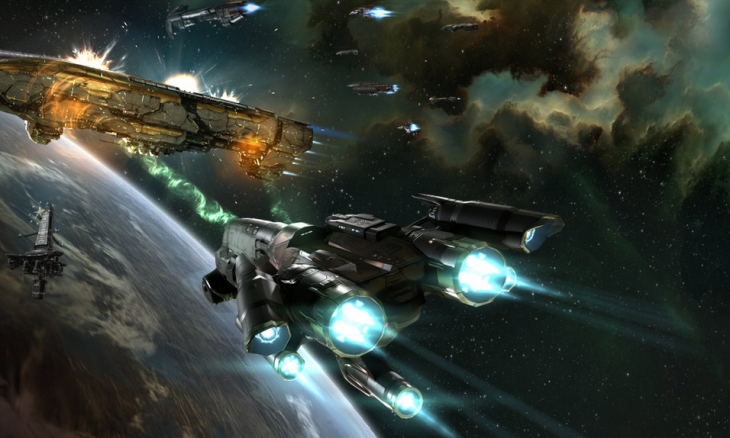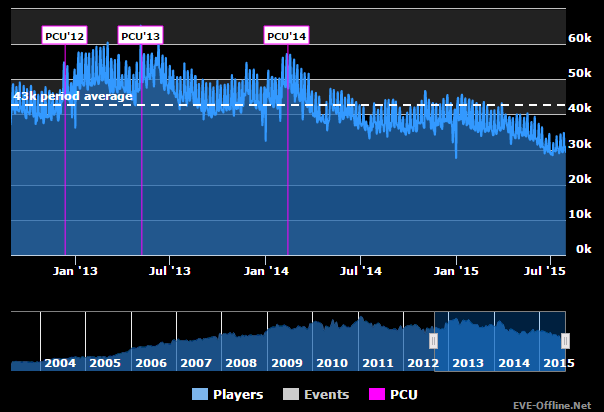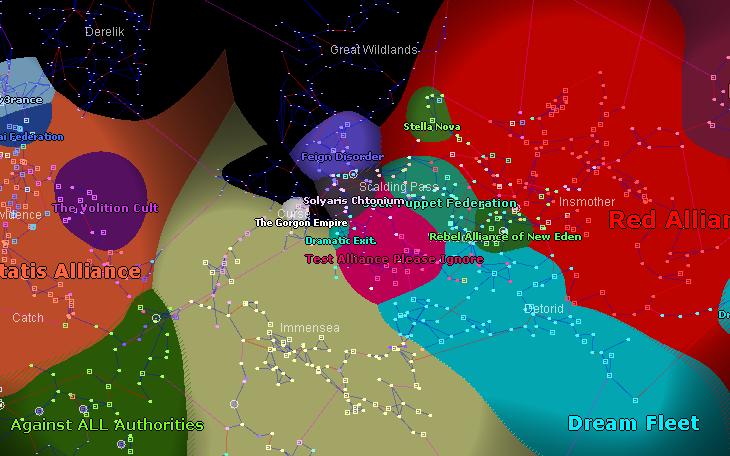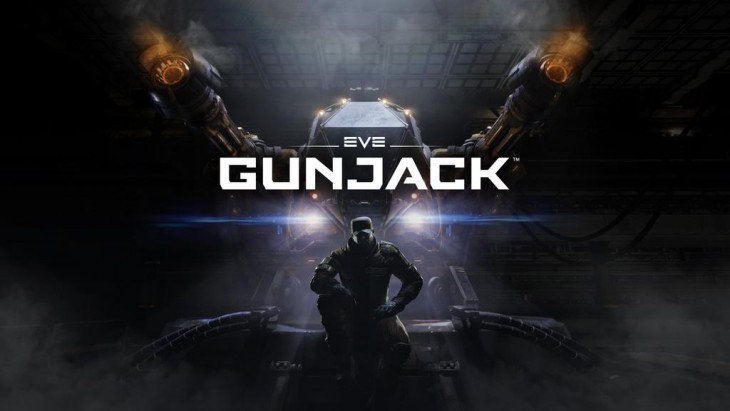Two years into its second decade, EVE Online is in serious trouble.
This is a game that, at its best, is about politics – influence, war, territory, diplomacy, tribal gangs flinging spaceships and slurs at each other. Lately, it’s about different things. Things that other games do better. And the playerbase is shrinking as a result.
The actual number of subscribed accounts is hard to determine. We do know that it is significantly lower than the 500,000 subscribers figure trumpeted by CCP in February 2013, and that number included their relaunched Chinese server. Two posts by EVE blogger The Nosy Gamer dig into the exact numbers, though he believes that subscriptions don’t matter so much in an age of microtransactions and cash shops. He may be right; subscription numbers aren’t the best measurement of EVE’s vitality, given the number of players with multiple accounts. The most accurate metric we have is the number of accounts actually logged in and, thanks to EVE-Offline.net, that data is available.
It doesn’t look great.
2013 was a very strong year for EVE. After a brief slump at the end of 2013, the PCU (number of concurrent players) was spurred to what would become 2014’s high point by the famous Bloodbath of B-5RB, netting CCP a massive publicity win. It has been almost all downhill from there, with the huge activity gains of B-5RB wiped out within months. (I’m not cherry-picking data here – if anything, the 5-year graph looks worse.) From 2011 through 2014, EVE averaged nearly 50,000 concurrent players. For the past few months, New Eden has struggled to draw 30,000 – a drop of roughly 40%. How did we get here?
Let’s dispense with some oft-repeated untruths. No, CCP’s anti-botting/RMT efforts haven’t driven away nearly half the playerbase. That is silly for reasons of proportionality alone. No, the banning of ISBoxer and other automation tools is not responsible for the situation. The idea that a relative handful of multiboxers and ISBoxer users was inflating EVE’s PCU by tens of thousands is laughable. Players are leaving EVE because EVE isn’t interesting anymore and what makes EVE interesting is the political narrative.
To know why EVE is struggling, we must understand the political history of the game.
Influence.png
First, let’s clarify this “politics” idea. There are of course many things that EVE does decently enough and a few things that EVE is fantastic at. But EVE’s most unique feature (and its greatest draw) is the political narrative in nullsec space, the territory conquerable by players and unpoliced by NPC do-gooders. In this space, unique among MMOs for its particular brand of lawlessness, groups of players can forge political bonds, control and exploit territory, and strive for dominance unfettered. This is the arena that produced B-5RB, Asakai, the Goon/BoB conflict (known by its participants as the Great War), spies and commanders, heroes and villains, and the vast majority of the stories about EVE worth reading. It’s what makes the Verite Rendition Player Influence map so magical – every entity on that map is composed of hundreds or thousands of people, and they all have stories.
Take any major EVE battle of the sort that occasionally leaks into the broader media. The actual fighting itself is usually only interesting in a narrow technical sense; the actual experience of a player combatant may not be particularly exciting or even enjoyable. I’ve participated in my fair share of big fights. I remember high points like magnificent bombing runs and Doomsday beams flashing across the starfield. Mostly, I remember low points: interminable waiting, time dilation, my client stuttering and choking, tediously following the fleet commander’s orders, boredom and frustration. This is not interesting. What is interesting is the battle’s consequences; in New Eden, the battles have consequences – or at least, they should.
EVE doesn’t seem to produce many meaningful struggles anymore. B-5RB is, once again, illustrative: the battle occurred only as a result of a series of mistakes and uncharacteristic moves on both sides. Players without an obscenely expensive supercapital-class ship were directed away from the battle proper by their commanders, to preserve server resources for the more useful Titans and Supercarriers. Finally, the battle’s actual strategic consequences were muted, as both sides had sufficiently deep war-chests to replace their losses in a matter of weeks. The war itself was a passionless thing, driven mostly by the need to give players something to do. No righteous fury or struggle for survival animated B-5RB.
These are symptoms of the game’s political ossification.
Shuffling the Deck
In December 2009, EVE’s 12th expansion (Dominion) was released. Dominion came with a new sovereignty system – a complete overhaul of the mechanics determining player control of space in nullsec.
It was not a good overhaul. The pre-Dominion sovereignty system wasn’t good, exactly, but it lacked the more pernicious and damaging flaws that Dominion carried. Dominion-era sov warfare was a grinding, oddly-designed mess that heavily favored the defender. The complexity of the system discouraged new blood from attempting to enter the nullsec game and conferred further power to the veterans who already held space.
The number of new alliances moving into nullsec plummeted and even alliances with terrible leadership were able to hold their space indefinitely, simply because grinding through Dominion’s legion of timers and other obstacles was not worth it. Even the conquest of uncontested space was a chore. To successfully attack, alliances needed more members. They began to merge and grow. Coalitions became less “alliances of alliances” and more autocratic.
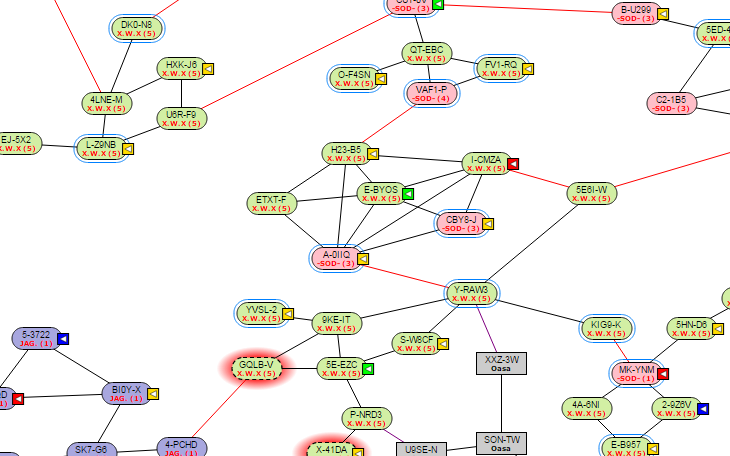
As alliances bloated in size, their culture and identity became diluted. As they became richer and more well-established, leaders were less inclined to risk their hard-won gains on wars or other failure-prone ventures. The Verite Influence map started to have mostly the same names on it. For years.
These player organizations, mostly safe behind the high walls of Dominion sovereignty, evolved, becoming more Byzantine and bureaucratic. Familiarity with the mechanics bred the ability to exploit them. Coalitions developed unified communications platforms, reimbursement and welfare programs, and a whole system of internal management. Groups that were once autocracies now insulated the leader behind a wall of fleet commanders, diplomats, metagamers, and a dozen other kinds of functionaries and specialists. Some of this was happening before Dominion and would have happened without it, of course – players evolve. Dominion just reinforced the stifling effect that the sovereignty mechanics sparked.
After a few years of adjustment, EVE’s political narratives stopped being as interesting or dynamic as they once were. Everyone had fought everyone before, usually many times. Just as a first-past-the-post, all-or-nothing electoral system discourages third parties and narrows the field of viable candidates and parties, the all-or-nothing sovereignty system discouraged smaller alliances, eventually forcing the vast majority of nullsec players into a trinary, and then a binary, galaxy.
As a member of one of EVE’s most long-lived and influential alliances, Goonswarm Federation, I witnessed this phenomenon firsthand. The first half-decade of EVE was a time of consequences – dramatic upsets, narrative, clashing ideologies, space opera made real. After half a decade of Dominion all we had left was the core gameplay, and it’s not a secret that much of EVE’s core gameplay isn’t actually very good.
Fozziesov
To CCP’s credit, after more than five years of Dominion stagnation, they have finally come around to replacing the Dominion sovereignty system. Developed under the aegis of Game Designer CCP Fozzie, the new mechanics are almost universally referred to by the community as “Fozziesov.”
The way Fozziesov actually functions isn’t that important; it follows the EVE Online tradition of taking already-complex game mechanics and obscuring them further behind weird terminology. Activity Defense Multiplier? Entosis Link? Ugh. The question is: will it work? If it does work, will it be enough to revitalize the nullsec political game? Ideally, Fozziesov would shake up or break up EVE’s coalitions and lower the stakes of conflict. Many prominent coalition and alliance leaders have in fact stated that they’d welcome to a return to the freewheeling, balkanized EVE landscape of old.
It’s an extraordinarily difficult task for CCP to attempt, akin to reversing a historical process – taking EVE from coalitions down to nation-states down to tribal groups. However it is an extraordinarily difficult task worth doing; revitalizing the nullsec game is probably the only way to reverse EVE’s declining numbers.
Respected EVE politicians and alliance leaders are skeptical. Reaction to Fozziesov in action has largely been neutral or negative. This doesn’t necessarily mean anything; EVE players will gleefully attack CCP for any action they take or propose to take and it’s too early to make a definitive judgement of Fozziesov. Still, it is worrying. A failure to return dynamism and fun to nullsec could be fatal. One experienced fleet commander hits the nail on the head:
Mechanics might change, but the general vibe around Eve is that most people have been around the block so many times that they don’t want to put much effort into it anymore. Content creators of olde are largely inactive. Apathy from the old guard isn’t a bad thing – as long as there is a fresh generation to take over. But does that exist?
I hope that new generation does exist because this game is worth saving. Let’s not underrate what CCP has accomplished: more than a decade after launch, despite everything, EVE Online is unique. Games that pitch themselves as competitors to EVE tend to fail (see also: ArcheAge, Perpetuum, Darkfall, etc). Figuring out how to make PvP territorial control work within an MMO is terrifically difficult. MechWarrior Online has been putting it off for three years now.
EVE is not dying. I suspect that New Eden will be around for another decade, if not longer. It’s just becoming less and less interesting – which could be worse than death.



